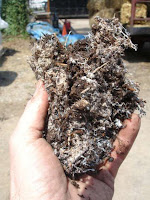Hi All,
I know you must be tired of us only discussing GMO-Labeling and the potential reversal of the pesticide ban. But these are really, really important issues. Connecticut has the opportunity to either take big steps in the right direction towards toxics safety in foods and school grounds, or taking ten steps backwards.
 |
| Healthy soil yields pest- resistant plants! |
There was a public hearing about HB 5155, an Act Modifying the Ban on Pesticide Applications on School Grounds on Wednesday, February 22. I was unable to go because it was the last day of our Accreditation Course, and I needed to moderate the Accreditation Exam (which everyone did very well on, by the way). Yes, it's a little bit ironic that our program accredited 36 new professionals prepared to offer the services that school groundskeepers and pesticide lobbyists claim are too difficult, too expensive, or simply impossible on the same day as this hearing.
Since I couldn't go, I submitted the following testimony:
 |
| What kind of chemicals should children really be exposed to? |
Connecticut took the lead on toxics safety and child health regulations with the pesticide ban. The pesticides banned by P.A. 09-56 have been linked to serious health issues including, but not limited to, birth defects, behavior disorders, respiratory disease like asthma and potentially cancer. Children are especially vulnerable to these dangerous chemicals because they play in the grass and because of their smaller, developing bodies.
The pesticide ban is a law that Connecticut should be proud of. Our state has prioritized the health of children over the importance of bright green grass, and the profits of chemical companies.
Widespread non-compliance must be addressed by education and training support from programs similar to the NOFA Organic Land Care’s Accreditation. More parents and families are choosing organic landscapers for their homes. To then expose their children to these harmful chemicals at school disrespects these parents’ values. As awareness grows about the potential threats of lawn chemicals, one can only expect greater support for the pesticide ban in Connecticut schools.
 |
| NOFA has the only internationally approved land care standards |
To address non-compliance with a law by simply eliminating the law is unthinkable. Using this standard, most new laws would need to be reversed in the first couple years that new regulations take effect. To move backwards in regards to laws protecting the health of children would be an embarrassment for Connecticut.
Sincerely,
Kristiane Huber
Bill Duesing, our Executive Director also submitted an eloquent testimony which you can read here, you can read all the testimonies on this page. Want to comment on the bill? Beyond Pesticides has set up this online petition which will help you contact your legislator directly.
Best,
Kristiane

No comments:
Post a Comment